Accounting Concepts: International Accounting Standards Board (IASB)
VerifiedAdded on 2023/06/10
|6
|1302
|319
Essay
AI Summary
This essay provides a comprehensive overview of six fundamental accounting concepts used in the preparation of financial statements, following the guidelines of the International Accounting Standards Board (IASB). It begins by defining and explaining the 'going concern' concept, highlighting how financial statements assume a company's continued operation and the implications of this assumption. The essay then delves into 'realization,' explaining when revenue is recognized, and the 'business entity' concept, which emphasizes the separation of business and personal finances. The discussion proceeds to 'consistency,' underscoring the importance of consistent accounting methods for comparability. The 'money measurement' concept is explored, emphasizing that only quantifiable transactions are recorded, and the essay also covers the 'duality' concept, which is the foundation of double-entry bookkeeping. Finally, it examines 'cost,' including the use of historical cost and the practice of asset revaluation, and 'accruals,' which focuses on matching revenues and expenses. Each concept is illustrated with practical examples to enhance understanding, making it a valuable resource for students studying accounting principles.
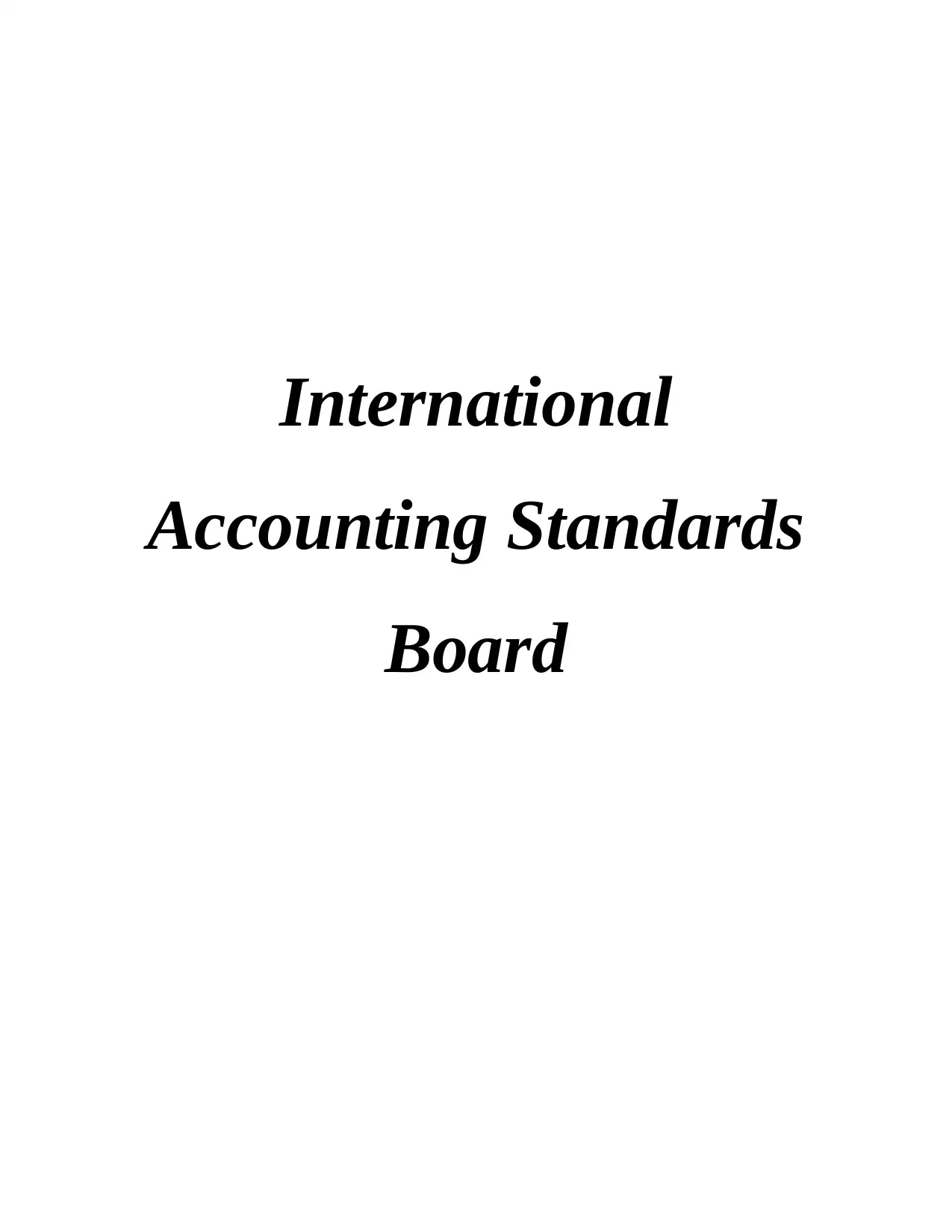
International
Accounting Standards
Board
Accounting Standards
Board
Paraphrase This Document
Need a fresh take? Get an instant paraphrase of this document with our AI Paraphraser
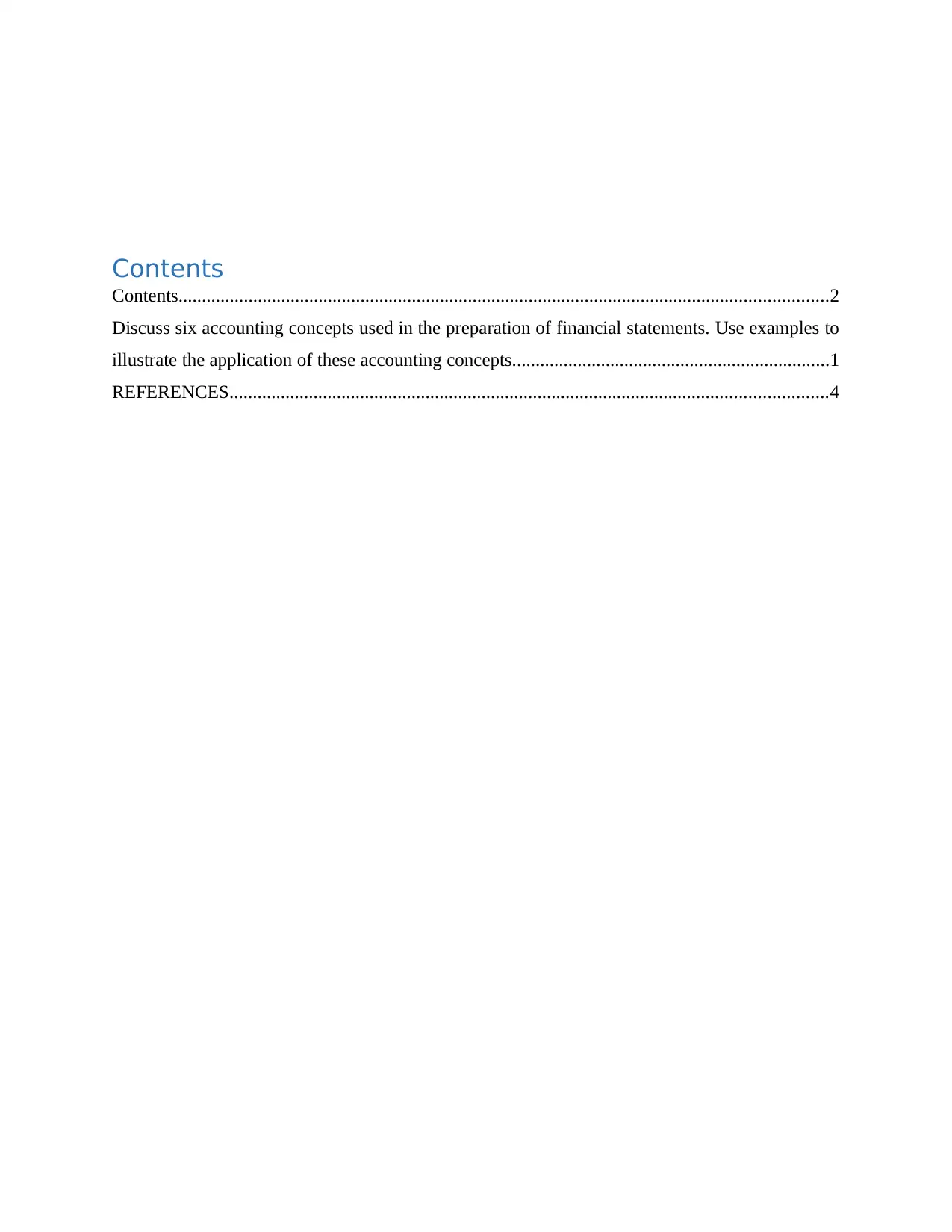
Contents
Contents...........................................................................................................................................2
Discuss six accounting concepts used in the preparation of financial statements. Use examples to
illustrate the application of these accounting concepts....................................................................1
REFERENCES................................................................................................................................4
Contents...........................................................................................................................................2
Discuss six accounting concepts used in the preparation of financial statements. Use examples to
illustrate the application of these accounting concepts....................................................................1
REFERENCES................................................................................................................................4
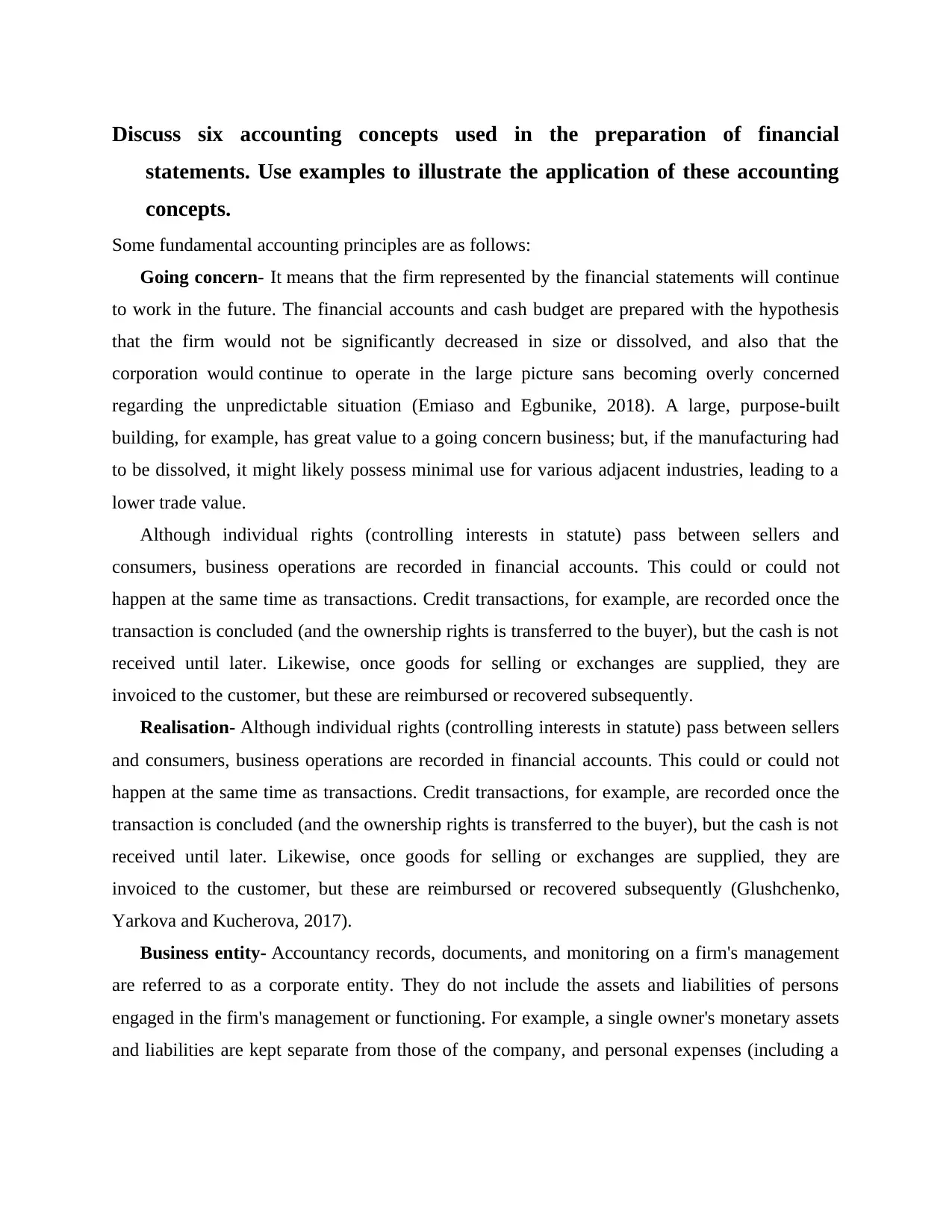
Discuss six accounting concepts used in the preparation of financial
statements. Use examples to illustrate the application of these accounting
concepts.
Some fundamental accounting principles are as follows:
Going concern- It means that the firm represented by the financial statements will continue
to work in the future. The financial accounts and cash budget are prepared with the hypothesis
that the firm would not be significantly decreased in size or dissolved, and also that the
corporation would continue to operate in the large picture sans becoming overly concerned
regarding the unpredictable situation (Emiaso and Egbunike, 2018). A large, purpose-built
building, for example, has great value to a going concern business; but, if the manufacturing had
to be dissolved, it might likely possess minimal use for various adjacent industries, leading to a
lower trade value.
Although individual rights (controlling interests in statute) pass between sellers and
consumers, business operations are recorded in financial accounts. This could or could not
happen at the same time as transactions. Credit transactions, for example, are recorded once the
transaction is concluded (and the ownership rights is transferred to the buyer), but the cash is not
received until later. Likewise, once goods for selling or exchanges are supplied, they are
invoiced to the customer, but these are reimbursed or recovered subsequently.
Realisation- Although individual rights (controlling interests in statute) pass between sellers
and consumers, business operations are recorded in financial accounts. This could or could not
happen at the same time as transactions. Credit transactions, for example, are recorded once the
transaction is concluded (and the ownership rights is transferred to the buyer), but the cash is not
received until later. Likewise, once goods for selling or exchanges are supplied, they are
invoiced to the customer, but these are reimbursed or recovered subsequently (Glushchenko,
Yarkova and Kucherova, 2017).
Business entity- Accountancy records, documents, and monitoring on a firm's management
are referred to as a corporate entity. They do not include the assets and liabilities of persons
engaged in the firm's management or functioning. For example, a single owner's monetary assets
and liabilities are kept separate from those of the company, and personal expenses (including a
statements. Use examples to illustrate the application of these accounting
concepts.
Some fundamental accounting principles are as follows:
Going concern- It means that the firm represented by the financial statements will continue
to work in the future. The financial accounts and cash budget are prepared with the hypothesis
that the firm would not be significantly decreased in size or dissolved, and also that the
corporation would continue to operate in the large picture sans becoming overly concerned
regarding the unpredictable situation (Emiaso and Egbunike, 2018). A large, purpose-built
building, for example, has great value to a going concern business; but, if the manufacturing had
to be dissolved, it might likely possess minimal use for various adjacent industries, leading to a
lower trade value.
Although individual rights (controlling interests in statute) pass between sellers and
consumers, business operations are recorded in financial accounts. This could or could not
happen at the same time as transactions. Credit transactions, for example, are recorded once the
transaction is concluded (and the ownership rights is transferred to the buyer), but the cash is not
received until later. Likewise, once goods for selling or exchanges are supplied, they are
invoiced to the customer, but these are reimbursed or recovered subsequently.
Realisation- Although individual rights (controlling interests in statute) pass between sellers
and consumers, business operations are recorded in financial accounts. This could or could not
happen at the same time as transactions. Credit transactions, for example, are recorded once the
transaction is concluded (and the ownership rights is transferred to the buyer), but the cash is not
received until later. Likewise, once goods for selling or exchanges are supplied, they are
invoiced to the customer, but these are reimbursed or recovered subsequently (Glushchenko,
Yarkova and Kucherova, 2017).
Business entity- Accountancy records, documents, and monitoring on a firm's management
are referred to as a corporate entity. They do not include the assets and liabilities of persons
engaged in the firm's management or functioning. For example, a single owner's monetary assets
and liabilities are kept separate from those of the company, and personal expenses (including a
⊘ This is a preview!⊘
Do you want full access?
Subscribe today to unlock all pages.

Trusted by 1+ million students worldwide
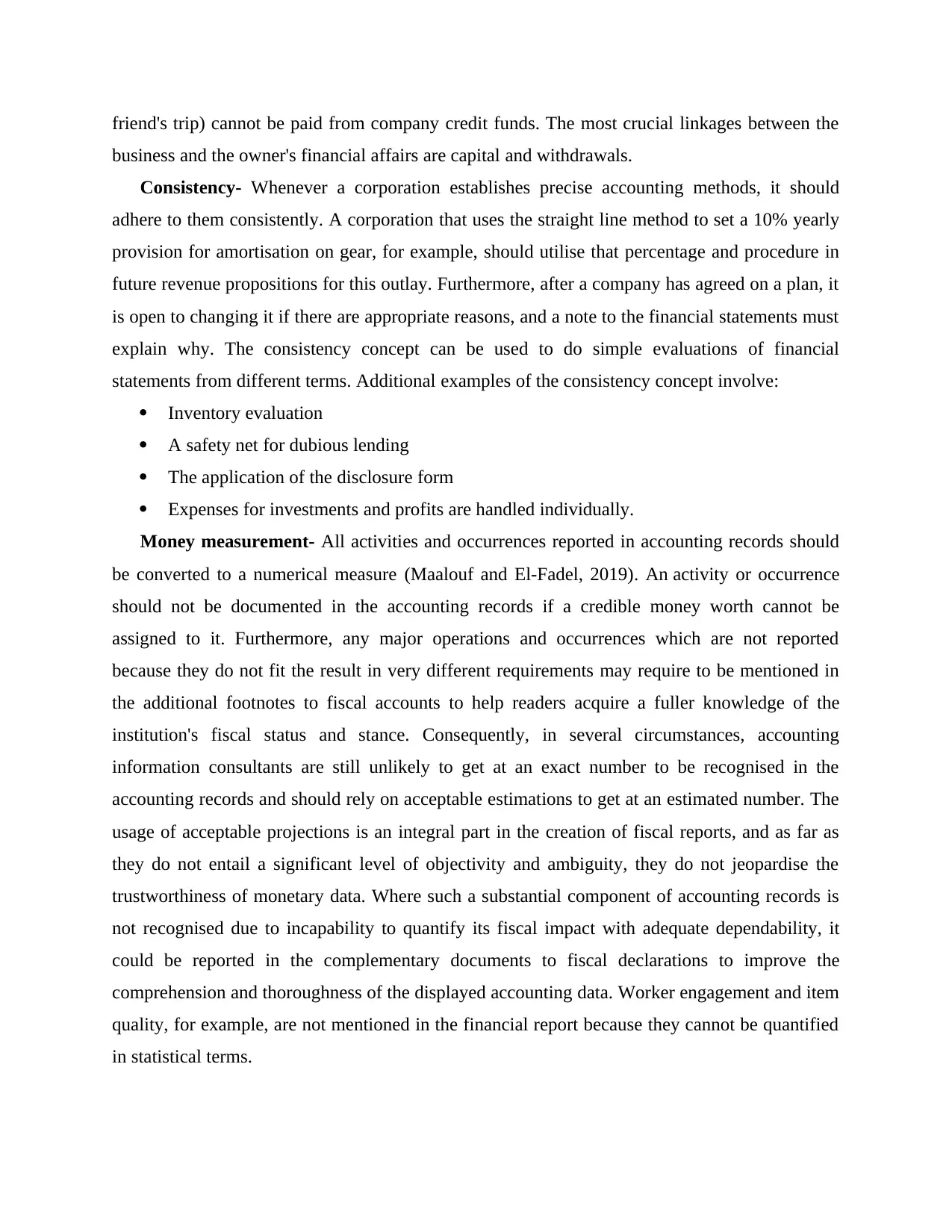
friend's trip) cannot be paid from company credit funds. The most crucial linkages between the
business and the owner's financial affairs are capital and withdrawals.
Consistency- Whenever a corporation establishes precise accounting methods, it should
adhere to them consistently. A corporation that uses the straight line method to set a 10% yearly
provision for amortisation on gear, for example, should utilise that percentage and procedure in
future revenue propositions for this outlay. Furthermore, after a company has agreed on a plan, it
is open to changing it if there are appropriate reasons, and a note to the financial statements must
explain why. The consistency concept can be used to do simple evaluations of financial
statements from different terms. Additional examples of the consistency concept involve:
Inventory evaluation
A safety net for dubious lending
The application of the disclosure form
Expenses for investments and profits are handled individually.
Money measurement- All activities and occurrences reported in accounting records should
be converted to a numerical measure (Maalouf and El-Fadel, 2019). An activity or occurrence
should not be documented in the accounting records if a credible money worth cannot be
assigned to it. Furthermore, any major operations and occurrences which are not reported
because they do not fit the result in very different requirements may require to be mentioned in
the additional footnotes to fiscal accounts to help readers acquire a fuller knowledge of the
institution's fiscal status and stance. Consequently, in several circumstances, accounting
information consultants are still unlikely to get at an exact number to be recognised in the
accounting records and should rely on acceptable estimations to get at an estimated number. The
usage of acceptable projections is an integral part in the creation of fiscal reports, and as far as
they do not entail a significant level of objectivity and ambiguity, they do not jeopardise the
trustworthiness of monetary data. Where such a substantial component of accounting records is
not recognised due to incapability to quantify its fiscal impact with adequate dependability, it
could be reported in the complementary documents to fiscal declarations to improve the
comprehension and thoroughness of the displayed accounting data. Worker engagement and item
quality, for example, are not mentioned in the financial report because they cannot be quantified
in statistical terms.
business and the owner's financial affairs are capital and withdrawals.
Consistency- Whenever a corporation establishes precise accounting methods, it should
adhere to them consistently. A corporation that uses the straight line method to set a 10% yearly
provision for amortisation on gear, for example, should utilise that percentage and procedure in
future revenue propositions for this outlay. Furthermore, after a company has agreed on a plan, it
is open to changing it if there are appropriate reasons, and a note to the financial statements must
explain why. The consistency concept can be used to do simple evaluations of financial
statements from different terms. Additional examples of the consistency concept involve:
Inventory evaluation
A safety net for dubious lending
The application of the disclosure form
Expenses for investments and profits are handled individually.
Money measurement- All activities and occurrences reported in accounting records should
be converted to a numerical measure (Maalouf and El-Fadel, 2019). An activity or occurrence
should not be documented in the accounting records if a credible money worth cannot be
assigned to it. Furthermore, any major operations and occurrences which are not reported
because they do not fit the result in very different requirements may require to be mentioned in
the additional footnotes to fiscal accounts to help readers acquire a fuller knowledge of the
institution's fiscal status and stance. Consequently, in several circumstances, accounting
information consultants are still unlikely to get at an exact number to be recognised in the
accounting records and should rely on acceptable estimations to get at an estimated number. The
usage of acceptable projections is an integral part in the creation of fiscal reports, and as far as
they do not entail a significant level of objectivity and ambiguity, they do not jeopardise the
trustworthiness of monetary data. Where such a substantial component of accounting records is
not recognised due to incapability to quantify its fiscal impact with adequate dependability, it
could be reported in the complementary documents to fiscal declarations to improve the
comprehension and thoroughness of the displayed accounting data. Worker engagement and item
quality, for example, are not mentioned in the financial report because they cannot be quantified
in statistical terms.
Paraphrase This Document
Need a fresh take? Get an instant paraphrase of this document with our AI Paraphraser
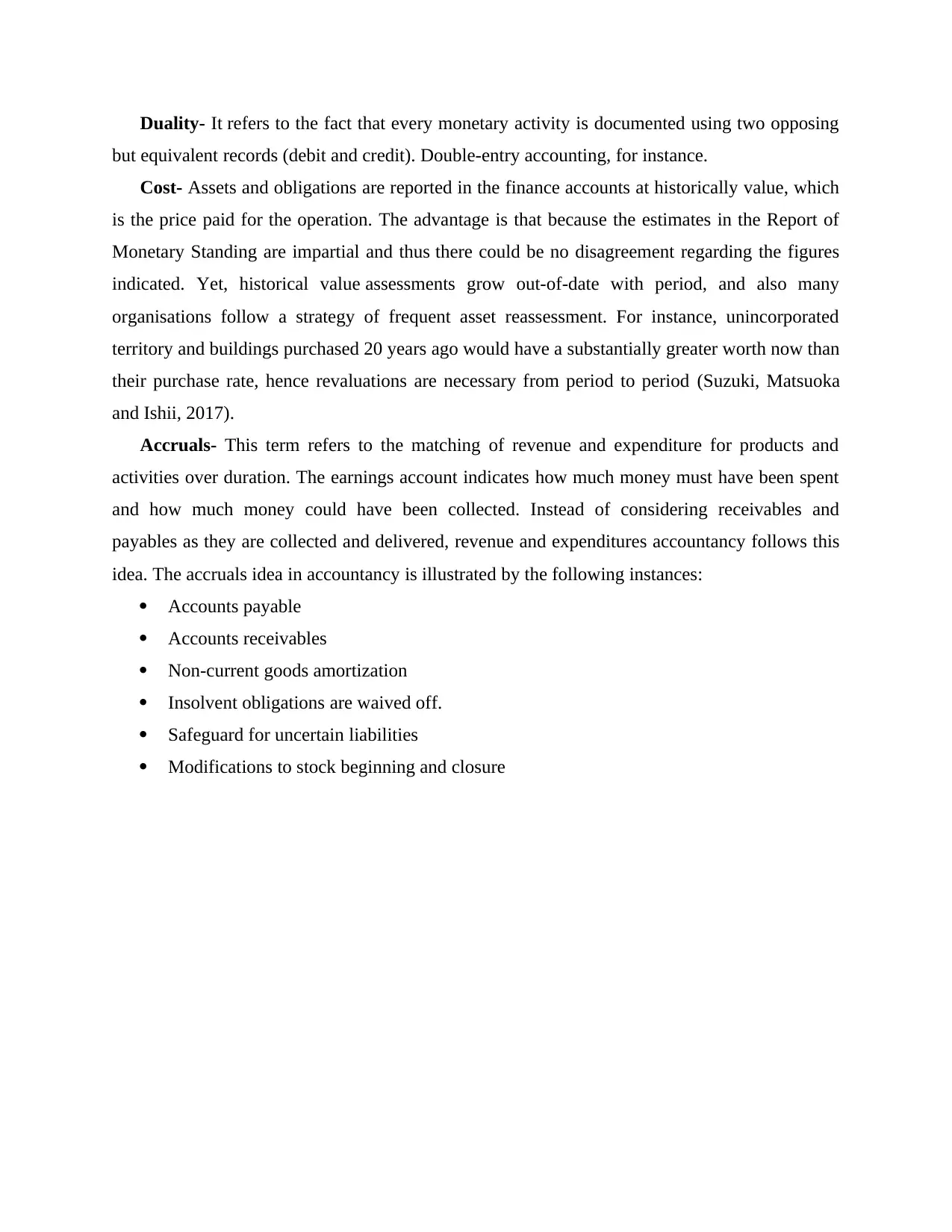
Duality- It refers to the fact that every monetary activity is documented using two opposing
but equivalent records (debit and credit). Double-entry accounting, for instance.
Cost- Assets and obligations are reported in the finance accounts at historically value, which
is the price paid for the operation. The advantage is that because the estimates in the Report of
Monetary Standing are impartial and thus there could be no disagreement regarding the figures
indicated. Yet, historical value assessments grow out-of-date with period, and also many
organisations follow a strategy of frequent asset reassessment. For instance, unincorporated
territory and buildings purchased 20 years ago would have a substantially greater worth now than
their purchase rate, hence revaluations are necessary from period to period (Suzuki, Matsuoka
and Ishii, 2017).
Accruals- This term refers to the matching of revenue and expenditure for products and
activities over duration. The earnings account indicates how much money must have been spent
and how much money could have been collected. Instead of considering receivables and
payables as they are collected and delivered, revenue and expenditures accountancy follows this
idea. The accruals idea in accountancy is illustrated by the following instances:
Accounts payable
Accounts receivables
Non-current goods amortization
Insolvent obligations are waived off.
Safeguard for uncertain liabilities
Modifications to stock beginning and closure
but equivalent records (debit and credit). Double-entry accounting, for instance.
Cost- Assets and obligations are reported in the finance accounts at historically value, which
is the price paid for the operation. The advantage is that because the estimates in the Report of
Monetary Standing are impartial and thus there could be no disagreement regarding the figures
indicated. Yet, historical value assessments grow out-of-date with period, and also many
organisations follow a strategy of frequent asset reassessment. For instance, unincorporated
territory and buildings purchased 20 years ago would have a substantially greater worth now than
their purchase rate, hence revaluations are necessary from period to period (Suzuki, Matsuoka
and Ishii, 2017).
Accruals- This term refers to the matching of revenue and expenditure for products and
activities over duration. The earnings account indicates how much money must have been spent
and how much money could have been collected. Instead of considering receivables and
payables as they are collected and delivered, revenue and expenditures accountancy follows this
idea. The accruals idea in accountancy is illustrated by the following instances:
Accounts payable
Accounts receivables
Non-current goods amortization
Insolvent obligations are waived off.
Safeguard for uncertain liabilities
Modifications to stock beginning and closure
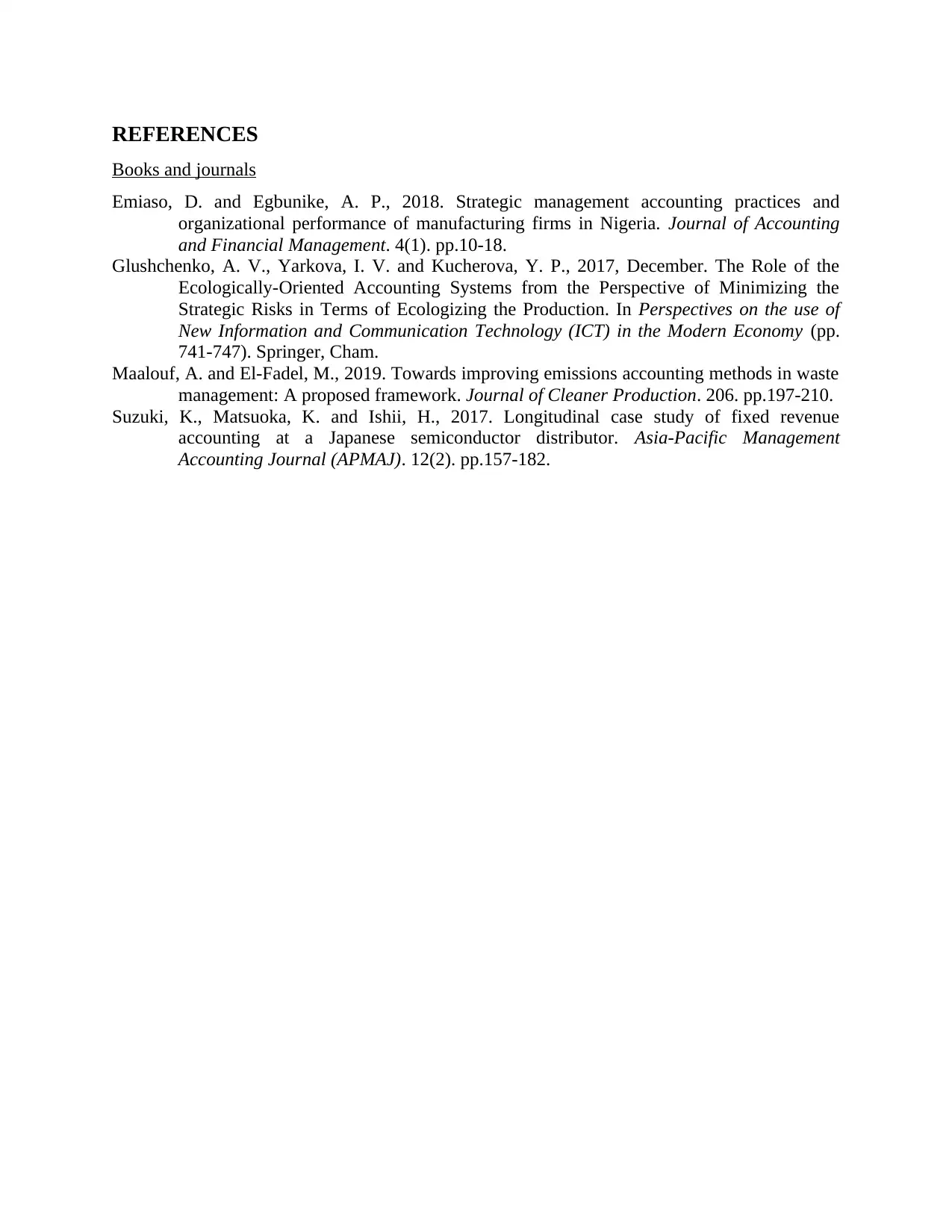
REFERENCES
Books and journals
Emiaso, D. and Egbunike, A. P., 2018. Strategic management accounting practices and
organizational performance of manufacturing firms in Nigeria. Journal of Accounting
and Financial Management. 4(1). pp.10-18.
Glushchenko, A. V., Yarkova, I. V. and Kucherova, Y. P., 2017, December. The Role of the
Ecologically-Oriented Accounting Systems from the Perspective of Minimizing the
Strategic Risks in Terms of Ecologizing the Production. In Perspectives on the use of
New Information and Communication Technology (ICT) in the Modern Economy (pp.
741-747). Springer, Cham.
Maalouf, A. and El-Fadel, M., 2019. Towards improving emissions accounting methods in waste
management: A proposed framework. Journal of Cleaner Production. 206. pp.197-210.
Suzuki, K., Matsuoka, K. and Ishii, H., 2017. Longitudinal case study of fixed revenue
accounting at a Japanese semiconductor distributor. Asia-Pacific Management
Accounting Journal (APMAJ). 12(2). pp.157-182.
Books and journals
Emiaso, D. and Egbunike, A. P., 2018. Strategic management accounting practices and
organizational performance of manufacturing firms in Nigeria. Journal of Accounting
and Financial Management. 4(1). pp.10-18.
Glushchenko, A. V., Yarkova, I. V. and Kucherova, Y. P., 2017, December. The Role of the
Ecologically-Oriented Accounting Systems from the Perspective of Minimizing the
Strategic Risks in Terms of Ecologizing the Production. In Perspectives on the use of
New Information and Communication Technology (ICT) in the Modern Economy (pp.
741-747). Springer, Cham.
Maalouf, A. and El-Fadel, M., 2019. Towards improving emissions accounting methods in waste
management: A proposed framework. Journal of Cleaner Production. 206. pp.197-210.
Suzuki, K., Matsuoka, K. and Ishii, H., 2017. Longitudinal case study of fixed revenue
accounting at a Japanese semiconductor distributor. Asia-Pacific Management
Accounting Journal (APMAJ). 12(2). pp.157-182.
⊘ This is a preview!⊘
Do you want full access?
Subscribe today to unlock all pages.

Trusted by 1+ million students worldwide
1 out of 6
Related Documents
Your All-in-One AI-Powered Toolkit for Academic Success.
+13062052269
info@desklib.com
Available 24*7 on WhatsApp / Email
![[object Object]](/_next/static/media/star-bottom.7253800d.svg)
Unlock your academic potential
Copyright © 2020–2026 A2Z Services. All Rights Reserved. Developed and managed by ZUCOL.



